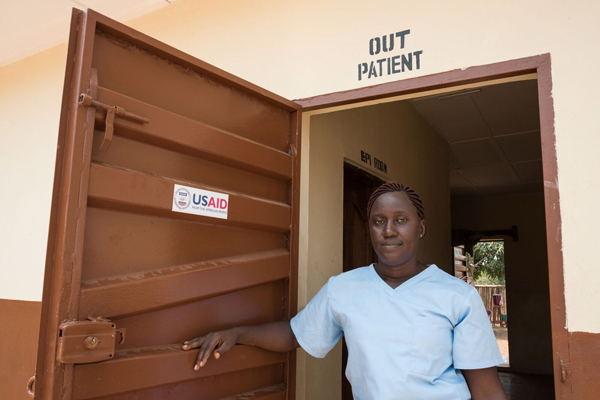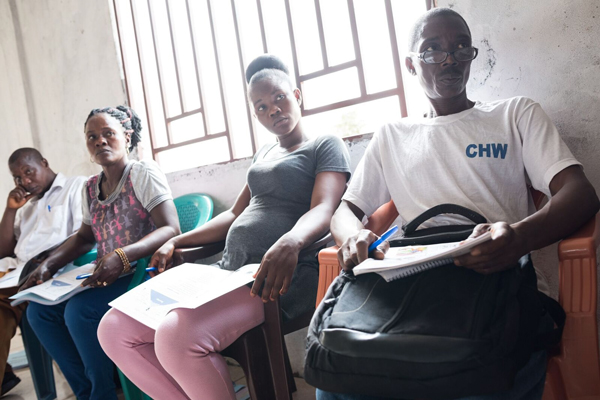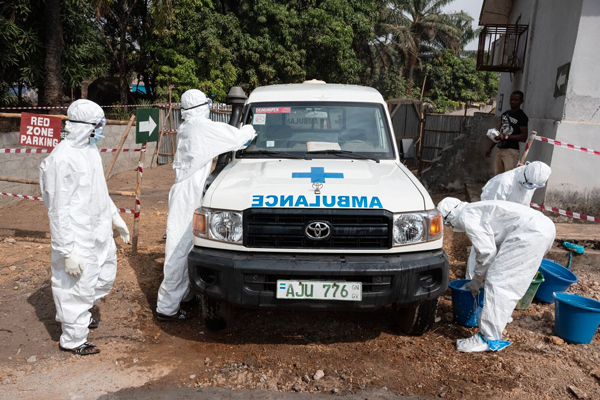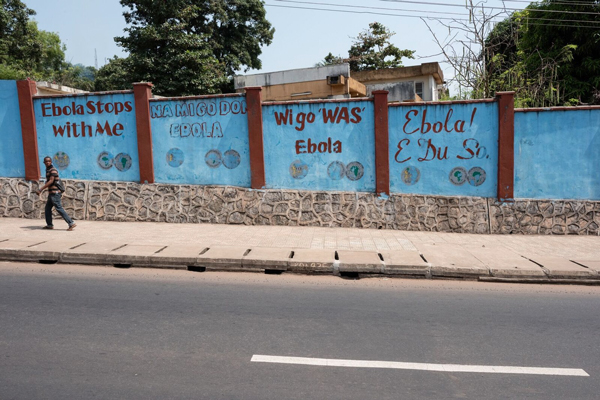Below is a list of all resources featured in the Post-Ebola Response Toolkit:
All Toolkit Resources
Priorities and Lessons Learned
National survivor networks were established during West Africa’s 2014-2016 outbreak, and with partner support, they have grown from informal entities to official organizations. APC observed successes and faced challenges in working with these networks during the life of the program.
Les réseaux nationaux des survivants étaient établi pendant l'épidémie de l’Afrique de l’Ouest de 2014-2016, et avec l’appui des partenaires, ils ont grandi des groupes simples aux organisations officielles. APC a observé des succès et des défis en travaillant avec ces réseaux pendant la duration du programme.
The 2014-2016 Ebola epidemic primarily affected three countries, two anglophone (Liberia and Sierra Leone) and one francophone (Guinea). APC’s program succeeded in sharing documents and research findings among its three country offices and local counterparts despite the ever present language barrier. Key strategies are addressed in the document.
L'épidémie d’Ebola du 2014-2016 a affecté trois pays principaux, deux anglophones (le Libéria et le Sierra Leone) et un francophone (la Guinée). Le programme d’APC a réussi en partageant les document et les recherches parmi les trois bureaux pays et les parties prenantes locales, malgré la différence des langues. Les stratégies clées sont expliquées dans le document.
Intervening through a comprehensive approach in an under-resourced sector, such as mental health, increases its opportunity of success, as it improves understanding and acceptance of mental health issues at the community level. This intervention has serviced the general population of Sierra Leone and provides a foundation for mental health services for the future.
Lessons learned from Guinea’s sentinel site approach to surveillance of Ebola survivors for preventing and containing future outbreaks and monitoring the health status of survivors.
In partnership with the Liberia College of Physicians and Surgeons, a graduate medical residency program, APC strengthened specialty care services for Ebola survivors by building capacity within the health workforce. Clinical specialists trained medical students, residents, and clinicians, while also providing specialized medical care in clinical areas that disproportionately affect the EVD survivor community. This program contributed to improved patient access to specialized care, decentralized service delivery, and increased health service utilization rates.
In November 2016, the ETP&SS program conducted a health facility assessment to understand the overall capacity of eight pre-identified health facilities. The assessment informed the development of a comprehensive facility activity plan, which captured service delivery, capacity building, and system strengthening activities. When implemented in a participatory manner, infrastructure interventions (physical, equipment, and water supply) can enhance government ownership of the decision-making process for quality of care.
In Sierra Leone, integrating Clinical Training Officers and Referral Coordinators within the existing health structures of service delivery and management has strengthened their mandate and benefited other categories of vulnerable groups.
Watch an interview with Guinea’s Director of National Health Security Agency, Dr. Sakoba Keita, discussing his perspectives on their country’s post-Ebola response strategy, including priority actions, benefits, challenges, gaps, best practices, and what could have been done differently.
Regarder une entrevue avec le Directeur Général de l’Agence Nationale de Sécurité Sanitaire de Guinée, Dr. Sakoba Keita, qui partage son point de vue sur la stratégie de Guinée post-Ebola, y compris les action prioritaires, les avantages, les défis, les écarts, les meilleurs pratiques, et les changements.
Interview with Ms. Amanda Ndorbor, National Coordinator for the EVD Survivor Secretariat in Liberia.
Watch an interview with Dr. Kwame Oneill, Manager of the Health System Strengthening Program in the Sierra Leone Ministry of Health and Sanitation discussing his perspectives on their country's post-Ebola response strategy.
Le programme ETP&SS vise à atteindre l’objectif de réduire le risque de nouvelles flambées d’Ebola en Guinée en appuyant le programme national de SA-Ceint. Il faut souligner ici que l’objectif principal de la SA-Ceint est de minimiser le risque de la résurgence de la maladie à virus Ebola à travers la surveillance active en ceinture des guéris d'Ebola soutenue par les communautés locales dans lesquelles vivent les guéris d’Ebola.
L’épidémie de la maladie à virus Ebola qui a frappé la Guinée en 2014-2015 a été une crise qui avait gravement menacé le système de santé et l’économie du pays. Cette épidémie a été à la base de l’émergence de plusieurs problèmes médicaux, psychosociaux, socio-économiques et professionnels dans le pays.
The assessments confirmed that survivors have sought primary treatment from health facilities when they first get sick, with more than 90 percent of both baseline and endline respondents reporting that they had received treatment at a health facility within the past six months (92.3 and 91.7 percent, respectively).
The CPES program has without any doubt responded to the needs to restore Ebola virus disease (EVD) survivors’ confidence in a country health system heavily disrupted by the outbreak; and ensured that their special needs were addressed in a timely and efficient manner.
The CPES program seeks to address challenges faced by Ebola virus disease (EVD) survivors through an integrated partnership approach between Government and development partners which strengthens service delivery to EVD survivors contributing to improving the overall survivors’ well-being.
Stories and Interventions
Dr. Sylvia Blyden; Sierra Leone’s Minister of Social Welfare, Gender, and Children’s Affairs; discusses the Ebola crisis and the government’s response.
Mr. Kabba, President of the Sierra Leone Association of Ebola Survivors (SLAES), talks about the challenges faced by Ebola survivors and shares his vision for the future.
Mr. Hassan, Orphans Coordinator and Spokesman of SLAES, shares the story of losing his family to the Ebola virus during the height of the outbreak.
Survivors of the Ebola outbreak suffer disproportionately from post-traumatic stress disorder, anxiety, and other mental health issues. Dr. Muron, a trainer at the Phebe School of Nursing Rural Training Institute, conducts a class to educate midlevel health workers on how the Ebola outbreak has contributed to mental health issues in Liberia and how they can help respond to improve the lives of their patients. To help the communities recover from the devastating impact of the outbreak, APC has supported mental health training and mentoring of mid-level health workers.
Video describing the ETP&SS cataract surgery program that helped survivors regain their sight. The program also helped researchers find out more about viral persistence of the Ebola virus. Testimonies from Ebola survivors, doctors, and nurses.
Every week, Ebola survivors come together with health workers and other community members in Guinea's hard-hit Kindia Region. They are part of the district’s sentinel site committee, which monitors the health and well-being of the area’s Ebola survivors. To prevent a resurgence of Ebola, APC helped establish 60 sentinel sites across Guinea, which enable the Ministry of Health to monitor illnesses in the Ebola survivor community and beyond. The sentinel sites allow for early detection and rapid response in the event of a suspected case.
Guinea’s fragile health system was deeply affected by the Ebola outbreak, which exposed the need for basic infrastructure improvements. At the bustling Ignace Deen Hospital in Conakry, APC renovated restrooms, crumbling staircases, walls, and ceilings, making it a safer, more hygienic, and more welcoming environment for patients. With these improvements, the hospital can now practice infection prevention and control and provide better care for Ebola survivors and the general population.
Dr. Senga Omeonga, himself an Ebola survivor working at St. Joseph’s Catholic Hospital in Monrovia, treats some of the country’s many Ebola survivors. APC supports two private faith-based hospitals, St. Joseph’s Catholic Hospital and Eternal Love Winning Africa (ELWA) Hospital, to provide primary and secondary health services for Ebola survivors. To get survivors connected with specialty services, APC has helped improve referral pathways within the country’s public health system.
Naomi, an Ebola survivor, is a member of the Montserrado county chapter of the National Ebola Survivors’ Network of Liberia (NESNL). She is one of many survivors who are finding hope by empowering fellow survivors to help improve their lives. APC has supported the growth of the Network to empower survivors and enable them to regain their health and become fully integrated with their communities.
Dr. Mamadou Oury Diallo, President of Guinea’s national network of Ebola survivor associations, Réseau National des Associations de Survivants d’Ebola de Guinée (RENASEG), is an Ebola survivor himself. Dr. Diallo gave up his job as a surgeon to lead the organization and help fellow survivors, who were shunned by their communities and left unemployed after recovering from Ebola. APC and International Medical Corps worked with RENASEG to develop leadership skills and organizational structures of the 23 member associations that represent Ebola survivors in Guinea.
This brief includes background, interventions, and results of APC’s support to the Sierra Leone Association of Ebola Survivors (SLAES). Based on a needs and capacity assessment conducted jointly by APC and PIH in December 2016, the project identified six priority areas for organizational capacity building.
Le système sanitaire de la Guinée a énormément souffert de l'épidémie Ébola. Apprenez plus sur l'évaluation des etablissement sanitaires et d’autres interventions du projet mise en œuvre par le programme ETP&SS pour renforcer le système sanitaire.
Guinea’s health system was severely impacted by the Ebola epidemic. Learn more about the health facility assessment and project interventions implemented by the ETP&SS program to help strengthen the health system.
To prevent future EVD outbreaks through early detection and rapid response, APC and its grantee, International Medical Corps, supported the MOH of Guinea in creating an early warning system using a targeted sentinel site surveillance model. The surveillance program was designed to detect any increase in fevers or other symptoms in both Ebola survivors and their immediate contacts.
Pour prévenir d’éventuelles épidémies de MVE grâce à une détection précoce et une riposte rapide, l’APC et le titulaire de la subvention, l’International Medical Corps, ont aidé le Ministère guinéen de la santé à créer un système d’alerte précoce utilisant un programme ciblé de surveillance des sites sentinelles. Le programme de surveillance vise à détecter toute montée de fièvre et d’autres symptômes ou maladies chez les survivants d’Ébola et leurs contacts immédiats.
Background, interventions, and results of APC's work in mental health in Sierra Leone, including the community healing dialogues and training in psychological first aid at Peripheral Health Units (PHUs).
APC supported the West African Clinical Research Consortium’s third annual conference in Conakry, Guinea, September 7-9, 2017. The report offers thirteen survivor-specific presentations on how to improve clinical care, address stigma, and support policy related to Ebola survivors, and also presents three keys findings.
This short story highlights the work that Guinea’s national Ebola survivor network, RENASEG, has accomplished with its 24 member organizations. The network’s vice president, Seny Yvonne Loua, explains what her group has done to help create jobs for Ebola survivors.
Women leaders of survivor organizations in Guinea, Liberia, and Sierra Leone are stepping up across the region to address challenges for Ebola survivors, while promoting gender equality in their countries.
Short story of how APC helped organize the leadership of the National Ebola Survivor Network of Liberia.
Success story describing the work of two mental health nurses, Sahr Mortatay Momoh, who runs the Western Area Rural District Mental Health Unit at the China-Sierra Leone Friendship Hospital, and Mohamed James Koroma, Child and Adolescent Mental Health (CAMH) Nurse in the country’s only pediatric mental health clinic.
In December 2016, ETP&SS supported the Liberia survivor association meeting and conducted interviews with five Ebola survivors and survivor association leaders.
Web-based visual story about Ebola survivors' personal experience undergoing cataract surgery.
Colleagues at Emory University Eye Center provided care and performed complex cataract surgery on Ebola survivors, including children, in Sierra Leone in July 2017.
M’balu Kamara is the Officer-in-Charge at Magbafth Maternal Child Health Post (MCHP) in Tonkolili district. She survived Ebola and came back to her health clinic, motivated to care for patients. With support from Advancing Partners, M’balu’s health facility is now able to serve its community better. The facility now meets infection prevention and control standards, which was made possible through facility renovation, installation of solar power, borehole drilling with a water tower to ensure 24/7 access to water, and through training and mentorship for health workers through the CTO.
Ebola survivors are often in need of specialty health services that cannot be provided at the local level. Nandy Fofana is a Referral Coordinator (RC) in Port Loko district. Nandy works with local health facilities to ensure that patients who need a higher level of care can be referred quickly. As part of the Sierra Leonean Government’s Comprehensive Program for Ebola Survivors (CPES), Advancing Partners has trained and mentored 18 RCs across the country to facilitate incoming and outgoing referrals at secondary and tertiary level of care facilities. They provide a critical link between primary care facilities and the more specialized levels of care within the health system.
Glenna Beckley, Finance Officer of the Sierra Leone Association of Ebola Survivors (SLAES), joined SLAES to advocate for the needs of Ebola survivors like herself as many survivors lost their employment because of health issues and stigmatization. With help from Advancing Partners and Partners in Health, SLAES offers survivor-to-survivor support groups and adult literacy classes that can help survivors regain their livelihoods in the aftermath of Ebola.
Tools and Training Materials
This is an orientation for frontline health workers on providing appropriate and respectful care for EVD survivors; the curriculum takes three days to complete.
Curriculum de formation des prestataires de soins pour le traitement des manifestations cliniques post-Ebola des guéris, développé par le Ministère de la Santé et projet APC (mise à jour : Mai 2018).
The primary goal of these community-based trainings is to provide peer-to-peer support at the local level; they also help to build relationships within communities.
Developed originally by WHO, this is an evidence-based, clinical guide for the assessment and management of mental, and neurological disorders in non-specialized health settings. It includes an overview guide, as well as selected presentation modules on essential care and practice, depression, psychoses, epilepsy, and self-harm/suicide. Each training module takes three days to complete in a classroom setting.
The Organizational Capacity Assessment (OCA) tool is designed to measure the overall capacity of an organization. It assesses capability in five key areas: governance, organizational management, program management, human resources management, and financial management. The results are compiled into an agreed-upon action plan that maps priority areas and actions that the organization will take to address problems and gaps.
L'Évaluation de la Capacité Organisationnelle (OCA) est un outil dont le but est d’évaluer la capacité d’une organisation. Il mesure les capabilités dans cinq domaines clés: gouvernance, gestion organisationnelle, gestion du programme, gestion des ressources humaines, et gestion financière. Le résultat est un plan d’action accordé par tous qui planifie les domaines prioritaires et les actions que l’organisation doit prendre pour adresser les problèmes et les écarts.
These tools are intended to supplement the above training and be used at health centers where EVD survivors are being treated. Tools include assessments for county or district health teams and clinicians, as well as a patient exit interview template and materials checklist.
A worksheet adapted from PATH’s training entitled Stronger Health Advocates, Greater Health Impacts to help organizations determine how to define their goals and objectives.
A worksheet adapted from PATH’s training entitled Stronger Health Advocates, Greater Health Impacts to help organizations determine which activities will be most helpful to furthering their advocacy strategy.
A worksheet adapted from PATH’s training entitled Stronger Health Advocates, Greater Health Impacts with templates for developing advocacy objectives and an advocacy work plan.
This tool is designed to measure staff capacity, infrastructure capacity, and equipment capacity in a limited resources health facility. The results from the assessment inform the type and level of support an implementing partner might provide to health facilities. In this case, the aim of the support provided was to improve the quality of medical services for Ebola survivors. As such, priority was placed on improving areas most pertinent to survivor needs.
This brief guide describes how to approach someone who may be experiencing a mental health problem. It is based on the principles of “look, listen, and link.” It also provides ethical “do’s and don’ts” to avoid causing any further harm, provide the best care possible, and act only in the person’s best interest.
This job aid provides basic, visual information for community health workers (CHWs) in Sierra Leone when assessing who qualifies for free care under the government’s program. It also demonstrates common health problems among Ebola survivors and basic mental health information.
This one-page poster provides a framework for assessing whether someone has basic symptoms of emotional distress, and what to do in each of several scenarios.
National Guidelines and Policies
MOH Guidelines for health care for Ebola virus disease survivors (updated September 2016).
MOH Guidelines for health care for EVD survivors (updated April 2016).
Guinea’s national policy on surveillance of its Ebola survivors, January 2016 through July 2018.
La politique nationale de surveillance des guéris d’Ebola en Guinée, Janvier 2016 au July 2018.
Informational brochure for Ebola survivors about the risks of transmission of Ebola through semen and other body fluids, based on WHO, NIH, and other research findings. Also includes information on how to access semen testing programs.
Related Journal Article(s)
Harvard School of Public Health, JSI, and the Liberia MOH conducted interviews with 108 respondents to EVD in Liberia. They found that resilience improved more when prioritized by global and national actors compared to community leaders and local health actors. They concluded that full resilience has not yet been achieved and will take sustained collaboration across these sectors.
This article examines records from 1001 consultations from 166 patients between February and June 2015. Most frequent complications were arthralgia, fatigue, abdominal pain, headache, anemia, skin disorders, back pain, and alopecia. Ocular complications in 94 survivors (uveitis the most common)—redness in eyes during acute illness, was a predictor for development of uveitis.
This article evaluates EVD survivors at a clinic in Monrovia for eye exam findings. Twenty-one of the 96 examined survivors developed EVD-associated uveitis, and three developed optic neuropathy. Recommends mobilization of eye care resources for survivors.
This article follows 341 patients for a year after being in the hospital for EVD. Of these, there were 46 cases of uveitis, six of episcleritis, and three of interstitial keratitis. Uveitis relapses were found as late as 13 months after a negative test for EV in the blood.
This article summarizes ophthalmic manifestations of EVD from a cohort of survivors. Uveitis was the most common finding, as well as complications including cataract, retinal scarring, optic neuropathy, hypotony, and phthisis bulbi due to viral persistence, which can lead to vision loss.
This article examines psychiatric practices during the outbreak in Sierra Leone. The article suggests that a nurse-led approach without specialists can be successful, and describes collaboration among health professionals in “wellness workshops.”
This article calls attention to the gap in research and practice around mental health and infectious diseases.
Development and training of ex-Ebola Treatment Center (ETC) staff to deliver psychiatric intervention to peers in Sierra Leone.
his article identifies remaining scientific questions in research surrounding improved understanding, treatment and prevention of Ebola.
This article outlines the Global Rapid Response Team (GRRT) program, including recent response missions and roles in global health security. The article outlines how it can be used as a model for other countries to strengthen response systems.
This article outlines lessons from the Incident Manager of Liberia’s response, including discussion about the GH Security Agenda roadmap and other evaluations of the EVD response in Liberia.
This article provides an estimate of cases of Ebola that would have occurred had the disease spread beyond West Africa countries. With that in mind, it emphasizes the need for improved preparedness in global health security. It encourages increases in health personnel, bolstering of care facilities, developing lab capacity, and improving surveillance.
This article evaluates seven hypotheses about influence on lengths of delays between the start of an outbreak and response. It concludes that response is quicker with novel outbreaks, when the timing does not coincide with holidays, and when U.S. citizens are infected.
This article evaluates the role of community engagement, trust building, and social media in risk communication during health emergencies. Results emphasize the importance of disseminating information through local communities, and that social media should not be viewed as a replacement for traditional communication channels.
This article examines the travel of EVD through a road density index between the three countries. It finds that the density of the road network does influence incidence of Ebola and suggests a more exhaustive mapping of the area for management of future outbreaks.





